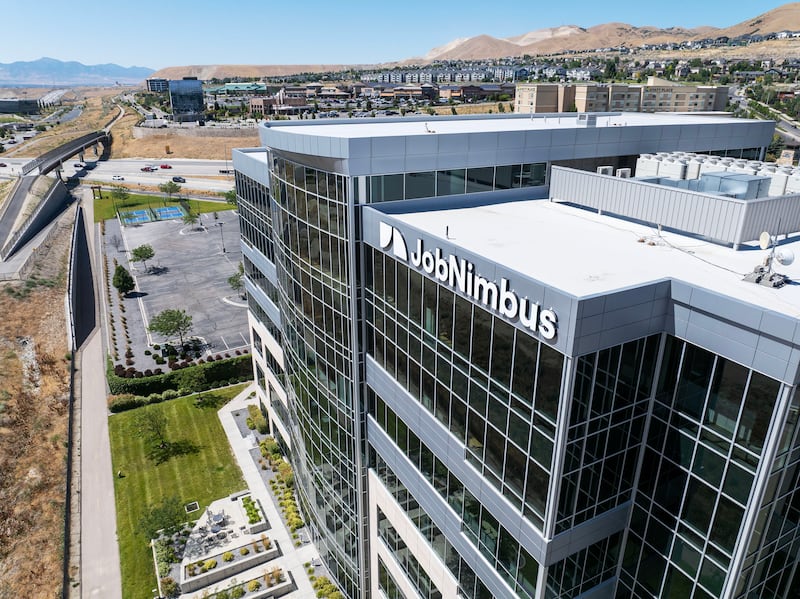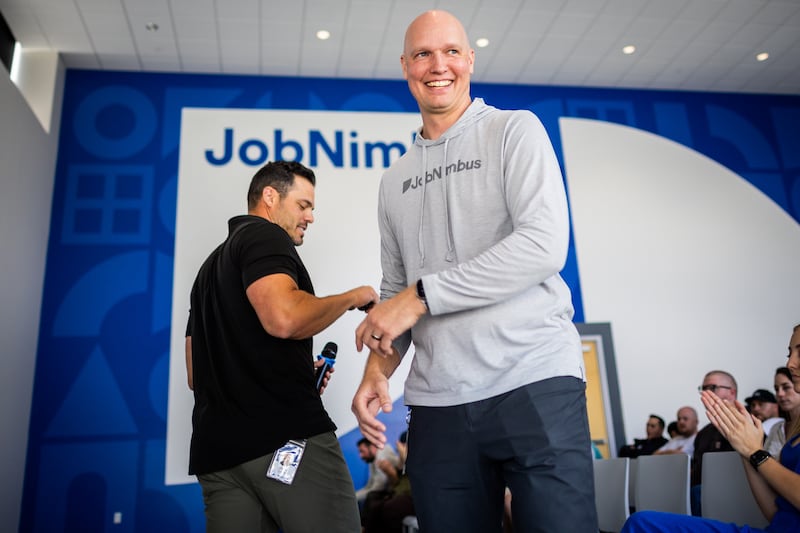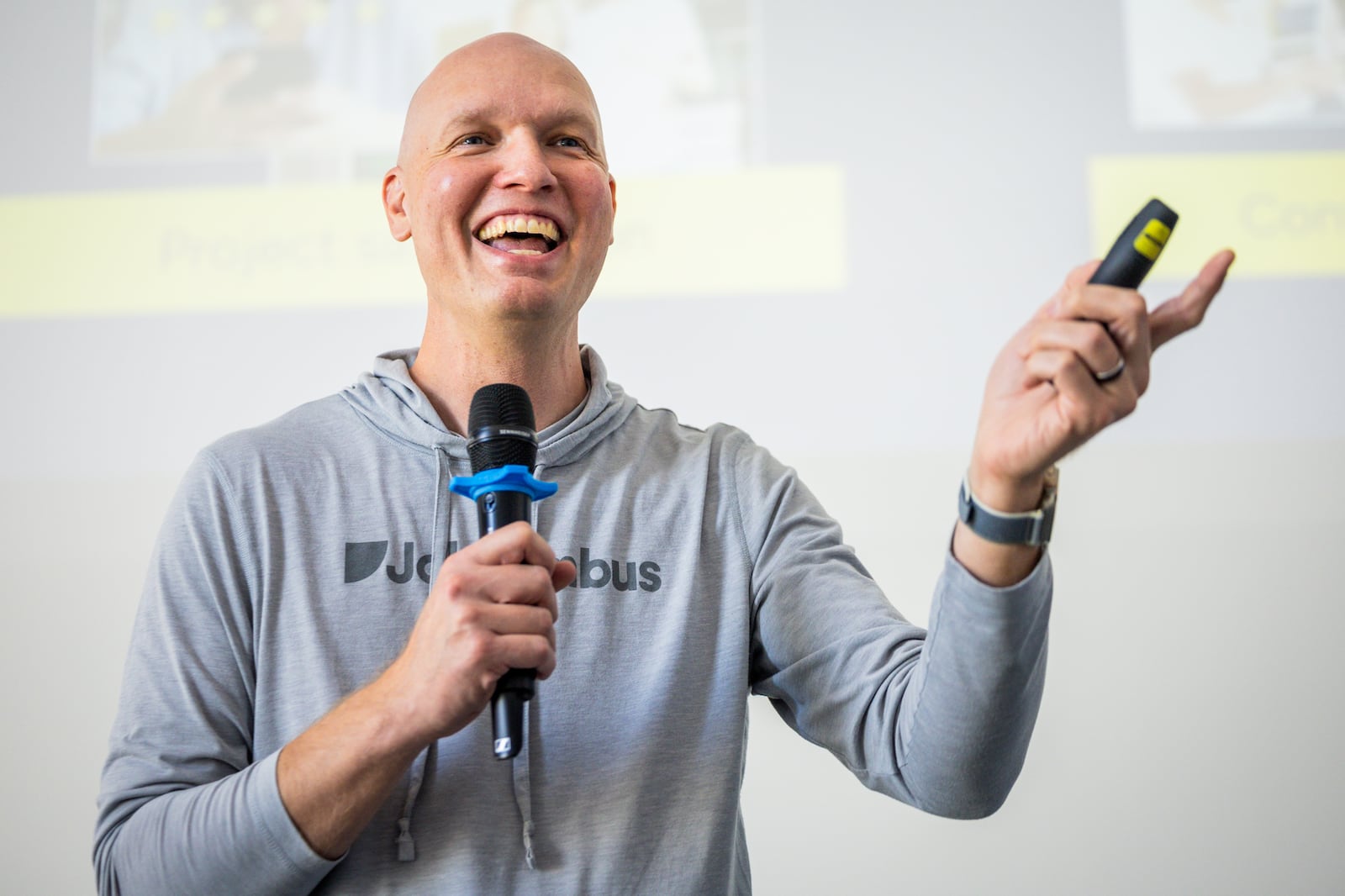Polymath, multi-talent, Renaissance man? Choose your own term, but when it comes to wearing a lot of hats, Ben Hodson has achieved master status.
After leaving the University of Washington with degrees in business administration and software development, Hodson founded his first company, the digital security and encryption firm Venafi, in 2000. That startup would go on to amass a slew of Fortune 500 clients before being acquired in 2020 by one of the world’s foremost private equity firms, Thoma Bravo, for $1.2 billion.
Along the way, Hodson launched numerous companies while spending his “free” time writing books, playing in bands, making films, hiking, rock climbing and tearing it up on his surfboard.
But 2013 was an inflection point for Hodson, the year a chance meeting over lunch with a group of roofers seeded another business idea.
Turns out, there was a dearth of software or automation solutions in the roofing industry at the time. Most businesses were still relying on a whiteboard covered with sticky notes to track their jobs, while paperwork — like estimates, billing and insurance claims — was still being filled out and shuffled around by hand.
Hodson was gobsmacked.
“After talking to these guys, it became clear that what little software was out there sucked,” Hodson says. “I asked them to show me the app. There was no app. They were still using programs that had to be installed with a CD, and you couldn’t use the software unless you were in the office.”
Ben started with the pain point. He talked to roofers. He didn’t just jump into code. He understood that most of them live on jobsites or in trucks, and he built a mobile-first platform that gave them instant value. That gave him street cred.”
— Chris Litster
The conversation revealed to Hodson how dramatically underserved the roofing industry was, despite being a market valued at over $28 billion in the United States today (and headed for $43 billion by 2033). It appeared, Hodson said, that while the brightest tech talents were immersed in building social media networks, the trades were being widely ignored.
“I realized the smartest people in America were trying to make Twitter run better,” Hodson says.
Hodson saw an opportunity to build something bigger: a complete platform to help contractors run their businesses better, elevate efficiencies and profits, and provide better and more consistent services for their customers. Thus, JobNimbus was born.
But the challenge was bigger than engineering a software solution, Hodson said. The new platform’s clients were generally not a particularly tech-savvy group, and the tools needed to be jobsite-friendly. Clearly, an app-forward approach was key, as was determining exactly where the pain points existed for both the contractors and their customers.
“Everybody has a story about a contractor that let them down,” Hodson says. “Not because they didn’t know their job but because they lacked the tools, processes and business acumen to deliver a product.”
So Hodson parlayed his initial chat with roofers into an intentional data-gathering effort, interviewing scores of contractors to clearly define the problems at hand. That laid the groundwork for the debut JobNimbus platform build.
The company officially formed later in 2013, and by the end of the year, JobNimbus had 100 roofing contractors as clients and about 300 users.
Hodson and his team bootstrapped JobNimbus’ market growth and product development for the next seven years, but brought in investors at a juncture where the company had achieved product-market fit and was ready to really ramp up the scaling effort. At the end of 2020, JobNimbus had a staff of 80 and $10 million in annual revenues. A $53 million funding round in early 2021, led by San Francisco-based growth equity firm Mainsail Partners, did indeed push JobNimbus’s growth arc to the next level.
“Last year we hit $60 million in revenue with 200 employees,” Hodson says.
The current version of the JobNimbus platform is widely multifunctional and features an app-based interface that’s garnered rave reviews from clients. The company is also entering new contractor categories like gutters and fencing.
“As soon as you get a lead, it kicks off emails, text messages, workflows — we call them automations,” Hodson explains. “Push a button, it generates a measurement, grabs aerial measurements, creates a materials list, calculates profit margin. We’re talking hours of work condensed into moments.”

The platform even meshes with material suppliers to coordinate timely and efficient deliveries to jobsites.
“We even integrate with suppliers, set up pizza-style delivery, dropship shingles the day of the job. Tear off, re-roof. Click a button when you’re done,” Hodson continues. “It’s truly end-to-end.”
AI and automation boost a new entrant
Trent Chapman, who grew up in the construction industry but later pivoted to real estate, mortgages and software, was only planning on playing the role of financial backer when King Roofing launched in 2021. But then things took a turn.
“I was just going to be an investor, put up the startup money, help out,” Chapman says. “Instead of just consulting, I decided to jump in.”
A fortuitous family connection helped turbo-charge King Roofing’s entrance into a highly competitive field.
“A lot of roofers start out small, pen and paper,” Chapman says. “My brother was working for JobNimbus and became a developer for them. It ended up being a blessing in disguise.”
That JobNimbus connection became a foundational element of King Roofing’s operations, Chapman says, and the platform tools are being used to automate a wide swath of duties.
“We have the leverage of the job boards,” he continues. “I can visually see from my mobile phone or computer what jobs are in process, completed or need to be invoiced. It brings all your job boards into the cloud. Makes it easy for the whole team.”
King Roofing is also using several of JobNimbus’ artificial intelligence-enabled functions, like JobNimbus Engage, a feature that Chapman said has unified customer communications by automatically unifying the different contact pathways, such as phone calls, texts and emails.
He notes that his staff had some initial misgivings about adopting new, AI-powered tools, but once they recognized how it improved their time management challenges, they were converts.
“The companies that are going to improve margins have to adopt these AI tools,” Chapman says. “Instead of spending an hour per roof, you spend two minutes.”
The JobNimbus AI features, he continues, aren’t job killers but rather potential new profit centers.
“Now I can be a $40 million company with the same overhead,” Chapman says. “I’m not trying to use AI to replace you guys. I’m using it to pay you more money because you’re two to three times more effective.”

Chapman says the JobNimbus platform has been key to King Roofing’s growth arc, and it’s one that’s picking up steam. Despite early challenges, the company generated $1.8 million in revenues in its first seven months. The next year, Chapman says, was rife with growth pains and revenues only grew to $3.5 million. But 2023 saw $5.5 million in revenue and that jumped to $10.5 million in 2024. This year, King Roofing is on track to hit $15 million to $18 million.
“We wouldn’t have been able to do that without the leverage of JobNimbus software,” Chapman says.
The power to create contractor heroes
The power of the JobNimbus software platform was on the radar of San Mateo-based Sumeru Equity Partners for some years before the firm made a huge bet on the company, leading a $330 million funding round last November, a record Series B round for a Utah company. Already an investor in companies like Azuga and Buildium, Sumeru had seen success in backing platform software that helps small-to-mid-size businesses manage interconnected workflows, according to Sumeru growth partner Chris Litster.
“We met JobNimbus over two years ago,” Litster says. “What stuck out was the quality of the team, the culture, and the very clear sense of product-market fit. … They’ve built a company around the idea of making heroes out of contractors. That’s aligned with how we think — if you want to have impact on the customer, you need to have impact on the employee first.”
Litster credits Hodson as a founder who did it right.
“Ben started with the pain point,” Litster says. “He talked to roofers. He didn’t just jump into code. He understood that most of them live on jobsites or in trucks, and he built a mobile-first platform that gave them instant value. That gave him street cred.”
For Sumeru, the roofing industry is a “durable vertical” with natural resilience to market ebbs and flows that can roil other business sectors.
“Roofs don’t last forever,” Litster says. “They get damaged by weather. If a roof leaks, you fix it. This isn’t tied to new construction. It’s driven by replacement and insurance. It sits on top of one of the strongest asset classes in the U.S. — real estate.”
Litster says Sumeru loves “platforms that don’t just solve one problem” and underscored JobNimbus’s success in extending its platform across interconnected workflows.
“JobNimbus has gone from job boards to quoting, to materials management, to marketing and AI,” Litster says. “They’re meeting the customer wherever value can be delivered.”
Sumeru has made previous investments in Utah businesses. Litster says the region is rife with talent, a hotbed of innovation and an area that stands out for its tech sector’s collegial vibes. He also predicts JobNimbus is on the path to becoming a category leader as it expands its platform into other areas like siding, fencing, gutters and windows/doors.
“We want to help them build the marquee brand in this space,” Litster says. “They’re looking at all the right angles — understanding the customer, investing in the team, expanding the platform. That’s what it takes.”


